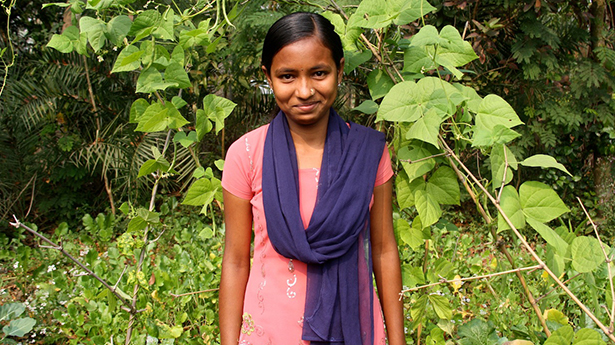Words and photos by Rucha Chitnis
Researchers predict that in a decade or so, India’s population will surpass that of China. Meanwhile, according to this report, India is also losing 2,000 farmers every day to climate change, farmer suicides, and development of prime agricultural land into mega real estate and industrial projects.
Given that India is already home to 25 percent of the world’s hungry, increasing food and water scarcity—plus the country’s vulnerability to climate change—could present one of the country’s greatest challenges for the future.
Swanirvar, a community group and Global Greengrants grantee based in West Bengal, India, is recognizing that the future of food security lies in transitioning towards sustainable models of food production.
Swanirvar works in the Sundarbans, a fragile mangrove ecosystem that is acutely vulnerable to climate change, and where farmer and fishing communities are still grappling to recover from a devastating cyclone that ravaged parts of West Bengal and Bangladesh in 2009.
“Male farmers are migrating to urban areas looking for alternative livelihoods, and women are bearing a disproportionate burden to manage care giving, farming, and household food security,” says Nilangshu Gain, Coordinator of Swanirvar.
Swanirvar works to shift the negative ingrained perceptions about agriculture among youth, who are attracted to jobs in other sectors. The team has implemented several environmental-education programs to educate rural youth to protect trees and local ecology. Swanirvar also partners with local schools to improve their curricula and quality of education.
“In the Sundarbans children memorize stories of Europe in schools, and there is no emphasis on local knowledge,” Nilangshu says.
Recognizing the fragile state of food security in the face of climate change, Swanirvar is also sensitizing youth groups to sustainable agriculture practices so that they can grow their own organic vegetables in small garden plots near their homes.
Nilangshu believes that sustainable agriculture is important to implement in a place that is already seeing the impact of climate change, and reducing carbon footprint seems like a necessary step to reduce further environmental harm to waterways, surrounding ecosystems, and community health. He emphasizes that capacity building and empowerment of youth is key to India’s future food security, especially in a region where farmers feel disenfranchised and marginalized by India’s development programs.
In 2013, Swanirvar partnered with nearly 11 high schools to grow organic vegetable gardens. Children were also trained to set up seed banks in 12 high schools, and over 300 students collected 27 varieties of traditional seeds. That same year, Swanirvar used a Greengrant to adopt a girl’s school near the Sundarbans, where it trained more than 100 girls in nutrition and how to farm using organic methods.
“Because of climate change, many girls are dropping out of school and are working as domestic workers to supplement family income,” Nilangshu says.
In fact, these areas are seeing an increase in trafficking of girls because of acute poverty and food insecurity. So Swanirvar believes that investing in adolescent girls is key.
Swanirvar believes these youth-empowerment trainings can provide critical skills to both girls and boys to shore up their families’ food security by planting vegetable gardens in their homesteads, schools, and communities.
“Our training programs have been successful,” Nilangshu says. “If we change our educational system, our nation will change. The hope lies is in the empowerment of youth and women.”





